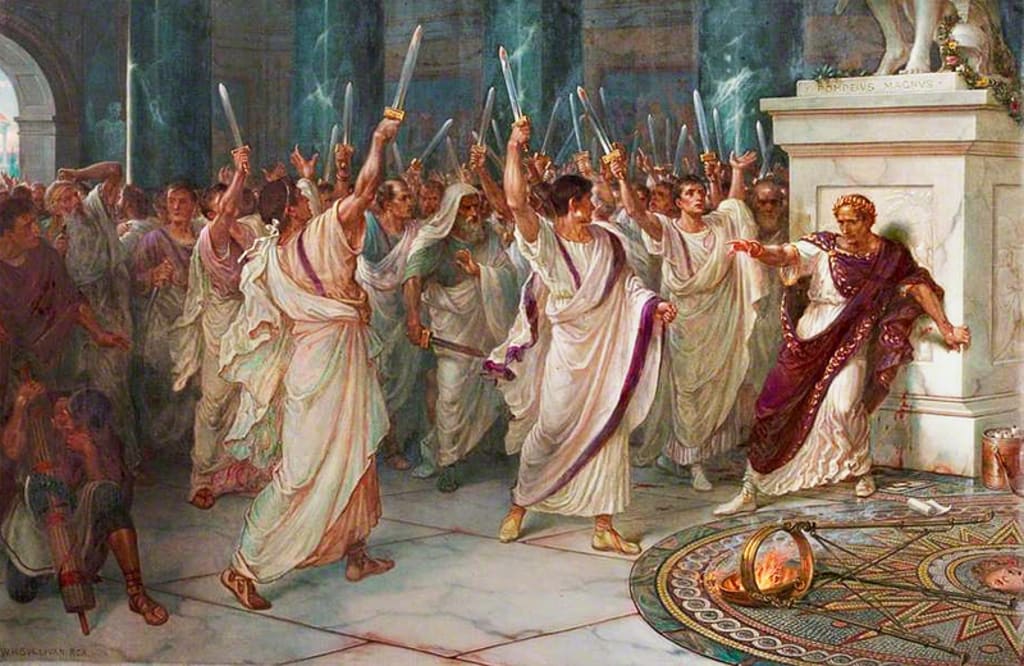The Death of Julius Caesar
The history behind the assassination

Some men within the political hierarchy of Rome opposed Caesar's ambitious reforms, believing him to be a tyrant. These whispers were further amplified by reports that Caesar planned to overthrow the Republic and take control as its king. To some, this showed Caesar's disregard for the Senate - an important institution in Roman politics. Ultimately, Marullus - a Tribune of the people - was imprisoned after he tried to protect Caesar's supporters.
According to Appian, on one occasion, Caesar was watched a ceremony for the Lupercal games which included Antony, as Consul for that year. Some in the crowd groaned at this, others applauded, but Caesar refused the crown, pleasing the majority of people. Again, Antony tried to crown Caesar and again he refused, drawing huge applause from the crowd. This has often been interpreted as a staged affair to see how the people would react.
Caesar's reasons for wanting to be King are still a mystery. Some historians have suggested that the conspirators' idea that they were saving the Republic was mere propaganda, and that many were motivated by more personal factors. Twelve of the 60 conspirators are described in enough detail for their motives to be assumed; Marcus Junius Brutus had fought with Pompey and been spared after Pharsalus, Welcomed by Caesar, he was appointed governor of Cisalpine Gaul. Brutus’ mother was a lover of Caesar and the two men were close. However, rumors circulated that he was Caesar's bastard and even his half-sister had prostituted herself to Caesar. Though a successful general, Gaius Cassius Longinus refused to fight against Pompeians, which prevented him from becoming consul. Caesar never really trusted him, and he was right not to.
Cassius had plotted to kill Caesar as early as 47 BC, and genuinely hated him. Certainly, motivated in part by his Pompeian loyalties, Cassius disliked Caesar for personal reasons and was the most active about the plot.
Decimus Junius Brutus had fought with Caesar in Gaul and was one of his most promising subordinates. He was made Praetor by Caesar and was set to be the governor of Cisalpine Gaul after Marcus Brutus’ term. Caesar loved Decimus, as shown in Caesar’s will that named him as a second-degree heir, a fact unknown to Decimus. This meant that if Octavian had died before, Decimus would have been legally adopted by Caesar and been his heir. His motivation is incredibly difficult to ascertain, the best argument usually coming down to pure greed for power.
Another veteran of the Gallic Wars Gaius Trebonius was one of Caesar’s most reliable Legates. Caesar had appointed him as Urban Praetor, then governor of Hispania Ulterior, and finally Consul in 45 BC. However, his year as consul was undermined by Caesar who appointed a replacement consul for Trebonius’ colleague who died just one day before the end of his term, which was considered a mockery of the consulship. Trebonius may well have seen this as an insult, motivating him to join the plot. Previously he also participated in a failed plot against Caesar suggesting to Antony that they should murder Caesar. The latter rejected the offer, and the plot had not developed any further.
One of Caesar’s strongest supporters Tillius Cimber was rewarded for his loyalty with the governorship of Bithynia and Pontus. However, he was deeply annoyed that Caesar did not recall his brother, Publius, who was exiled for unknown reasons, possibly leading to his involvement. Publius Servillius Casca was one of the oldest friends of Caesar. Casca appears to have fallen on hard times financially and may well have been angry that his old friend had not helped him more in this regard. His brother Gaius joined the plot to support Publius.
Pontius Aquila, who was publicly mocked by Caesar, had some land confiscated and given to Brutus’ mother, Caesar’s lover, giving him a deeply personal motivation for joining the plot.
Another man who was Caesar’s legate in the Gallic Wars, Servius Sulpicius Galba, was a thrifty man. He had guaranteed a loan of Pompey’s and when Pompey’s land was confiscated, he inherited the debt. Galba was annoyed, and had complained to Caesar who promptly paid the debt himself. Another debt later emerged from these same circumstances, which Caesar was less willing to help with, much to Galba’s outrage.
There were also rumours that Caesar may have been sleeping with his wife. Quintus Ligarius’s life was spared by Caesar after the battle of Thapsus, but he was later put on trial for apparently conspiring with Juba of Numidia, and threatened with exile. Cicero defended him, and Caesar pardoned him. Nevertheless, he had been deeply depressed at the idea of being exiled. Furthermore, Caesar had executed a relative of his for taking up arms against Caesar despite already having been pardoned. These reasons and friendship with Brutus likely brought him into the conspiracy.
Lucius Minucius Basilus – who served in the Gallic Wars was made praetor in 45BC, but instead of being given a province afterwards, was given a huge sum of money. This apparently deeply insulted him, motivating him to join the conspirators. The last in this group was Quintus Antistius – who seems to have joined the plot purely out of devotion to his close friend Brutus.
Little is known about the other 8 named conspirators other than they seem to have joined either based on personal grudges or wanting to be part of creating order during Caesar's reign
The sources vary on exactly who was the instigator, but Cassius and Brutus were the ringleaders. The former doing much of the recruiting, with the latter being more of a figurehead, their names and reputations crucial in convincing many others to join. Gradually, they convinced the 58 other conspirators to join the plot. At first, it was proposed that they kill Caesar, Antony, and Lepidus. However, Decimus Brutus opposed this and argued that this was to be surgical removal of a tyrant not a widespread political purge. The other conspirators relented. Caesar would soon be leaving on his Parthian campaign where he would be surrounded by soldiers and untouchable so they had to strike while he was in Rome. When Caesar announced a Senate meeting on the Ides of March just 4 days before he was scheduled to leave, they decided that this would be the perfect opportunity. Caesar would be separated from his entourage and the Conspirators could all be in the same place without raising suspicion. When the attack began, other Senators would quickly come to help them which gave them the perfect excuse to have armed soldiers nearby.
Caesar was approached by Casca and aSenator minutes before the meeting, both of whom asked for Caesar to do something.
Casca told Caesar that Brutus had told him everything, shocking Caesar before he realised the Senator meant that he intended to run for aedile.
The Conspirators grew anxious, Brutus subtly signaling that they were to kill themselves rather than be captured before it became clear that the Senator had merely been petitioning Caesar on another matter.
Despite more bad sacrifices, Caesar was convinced to go ahead with the meeting and entered the chambers with the Senators following.
Antony was quickly pulled aside by Trebonius and together, the two of them might have been able to fight their way out, so the Conspirators had entrusted Trebonius, one of Antony’s closest friends, with keeping him out of the way.
Sitting at the front of the Senate under a statue of Pompey, Caesar was approached by Cimber who requested Caesar recall his brother from exile.
The other conspirators gathered around, encircling Caesar, and suddenly Cimber pulled Caesar’s toga down, exposing his shoulder. Caesar, who as Dictator was protected by law, pushed Cimber back saying “This is violence!”. Casca then attacked the seated Caesar, but missed only cutting his shoulder. Caesar grabbed Casca’s hand, shouting “Casca what are you doing?!” while Casca simultaneously shouted “Brother help me!”. Caesar was able to rise and violently throw Casca away from him. However, by the time he did, Casca’s brother Servillius had attacked, stabbing him in the side.
Caesar continued to fight back but was attacked from all directions. Cassius slashing his face, Bucolianus stabbing him in the back and Decimus slicing his thigh. Still, Caesar fought back as much as he could. Brutus was the next to approach him and stabbed him in the groin. Pompey had done when he had been betrayed and murdered so he knew what to expect and he bowed his head in pain and resigned to his fate and died in a pool of blood at the base of the statue of Pompey. Suggestions that his last words were either “And you Brutus?” or “And you my son?” are largely disproven by ancient sources which simply say he groaned in pain. His body had 23 stab wounds, many of which happened after his death when the Conspirators had gathered around to stab his body, some even wounding each other. Only the 6 mentioned senators stabbed him while he was alive; therefore only 1% of the Senate took part in the assassination suggesting that they were quite panicked when they did it
Critics of Gaius Julius Caesar view him in various ways, but all agree that his death had a significant impact on the world. Even ancient historians who have a critical viewpoint of Caesar recognise the significant changes his death brought about. Two questions that are still heavily debated regarding Caesar are whether he made the world a better place and what would have happen if he lived longer.





Comments
There are no comments for this story
Be the first to respond and start the conversation.